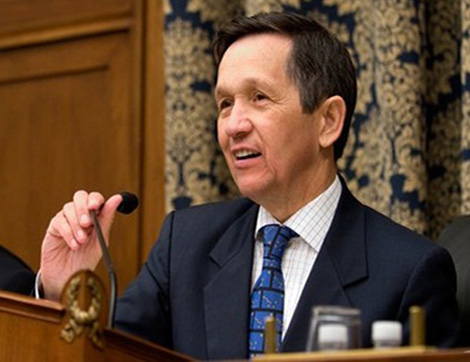
By Mark Anderson –
Rep. Dennis Kucinich (D-Ohio) on Sept. 21 introduced the National Emergency Employment Defense Act (NEED), H.R. 2990, which would remove the power of creating money from the privately owned and controlled Federal Reserve System and restore to Congress to constitutionally create money interest-free. The bill closely reflects the American Monetary Act (AMA), model legislation developed by the American Monetary Institute, which is headed by noted money historian Steve Zarlenga.
Kucinich has persisted in pursuing legislation to make the historic change of converting to interest-free government money spent into circulation—as the Constitution mandates—instead of being borrowed into existence from the private banking system at ruinous interest.
H.R. 2990 “would . . . reassert congressional sovereignty and regain control of monetary policy from private banks,” according to Kucinich, and the bill would “address our structural economic problems directly by creating over 7 million jobs,” when “the nation struggles with long-term unemployment at rates not seen in generations, and as infrastructure crumbles across the nation.”
Fractional-reserve lending—money lent beyond what banks have in their reserves, using a multiplier effect—would be eliminated, and the nation’s endangered infrastructure would undergo an unprecedented overhaul to account for much of the proposed job and money creation.
A fact sheet from Kucinich adds:
“The conflict of interest between private ownership of the 12 Fed banks and management of our nation’s monetary policy is ended by incorporating the Fed into the Treasury. The Fed is put on a budget and made accountable to the American people;
“A separate Monetary Authority (part of Treasury) made up of experts is made responsible for managing monetary policy. Its governing principle
is to ensure that the money supply is sufficient to meet the demand in the economy, and is not inflationary or deflationary. The Fed executes monetary policy actions.”
Moreover, “banks could continue to make profits by lending money that savers and investors make available to them for that purpose. Banks may also borrow from the Treasury,” says the fact sheet. “The Monetary Authority advises Treasury how much money is needed in the economy. Treasury advises Congress how much recycled or new money is required to pay off debt (as it comes due) and supplement existing revenues to fund infrastructure renewal, grants and loans to state and local governments, education and other priorities, as appropriated by Congress.”
When pressed about whether the national debt should be repudiated, Zarlenga said: “If there is illegitimate debt then it doesn’t have to be repaid.”
Investigative writer William Norman Grigg researched the Fed’s founding regarding the late Col. Edward Mandel House—a shadowy White House “assistant” who labored to create the Fed behind President Woodrow Wilson’s throne. Grigg feels that the Fed “has to be destroyed, from root to branch.” Even the creation of the Fed’s Board of Governors, chaired by a government appointee, was done to make the bank less distasteful to a skeptical public. “If you preserve any part of the Fed, you risk it reconstituting itself,” Grigg countered.
